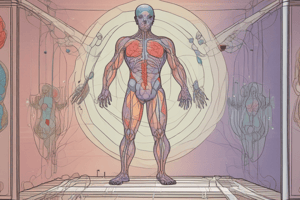Podcast
Questions and Answers
What are the main components of the circulatory system?
What are the main components of the circulatory system?
The main components are the heart, blood vessels, and blood.
What is the function of the heart in the circulatory system?
What is the function of the heart in the circulatory system?
The heart pumps blood through the body.
How do the blood vessels contribute to the circulatory system?
How do the blood vessels contribute to the circulatory system?
The blood vessels provide a network for the blood to flow through.
What are the substances carried by the blood in the circulatory system?
What are the substances carried by the blood in the circulatory system?
What is the importance of physiology in understanding living organisms?
What is the importance of physiology in understanding living organisms?
Flashcards are hidden until you start studying
Study Notes
Biology: A Journey Through the Building Blocks of Life
Biology is the study of life and living organisms, their structure, function, growth, and evolution. It is a vast and diverse field that encompasses a wide range of subdisciplines, including physiology, ecology, genetics, and biochemistry.
Physiology
Physiology is the study of the functions and processes that occur within living organisms. It is concerned with the mechanisms that regulate the body's internal environment, such as temperature, pH, and fluid balance. Physiology also examines the processes that sustain life, such as respiration, digestion, and circulation.
One of the key concepts in physiology is homeostasis, which refers to the ability of the body to maintain a stable internal environment in the face of external changes. This is achieved through a complex network of feedback systems that monitor and regulate various physiological processes.
For example, the body has a system for regulating temperature called thermoregulation. When the body is too hot or too cold, the hypothalamus in the brain sends signals to various organs and glands to adjust the body's temperature. This can involve sweating, shivering, or changing the rate of breathing to maintain a stable temperature.
Another important concept in physiology is the circulatory system. The circulatory system is responsible for transporting oxygen, nutrients, and other substances to cells throughout the body, and for removing waste products. It is made up of the heart, blood vessels, and blood.
The heart is a muscular organ that pumps blood through the body. The blood vessels, which include arteries, veins, and capillaries, provide a network for the blood to flow through. The blood carries oxygen and nutrients to the cells and removes waste products.
Conclusion
Biology is a fascinating field that provides insights into the workings of living organisms. From the smallest cells to the largest ecosystems, biology helps us understand the building blocks of life and the processes that sustain it. Physiology, in particular, provides a detailed look at the functions and processes that occur within living organisms, and helps us appreciate the complex systems that keep us alive.
Studying That Suits You
Use AI to generate personalized quizzes and flashcards to suit your learning preferences.




